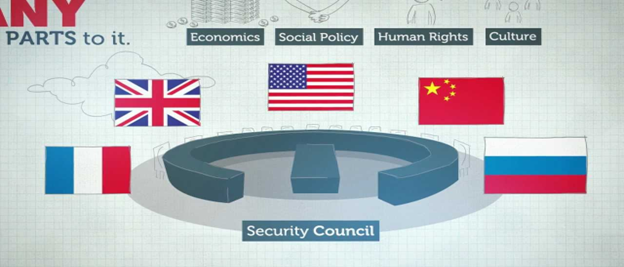Information and Regulation: Where is the Line?
Introduction
In a report entitled United Nations Global Principles for Information Integrity, the United Nations lays out a universal regulatory framework consisting of five principles. These are meant to be respected by the various international actors involved in media production and distribution. They are as follows:
- Societal trust and resilience
- Healthy incentives
- Public empowerment
- Independent, free and pluralistic media
- Transparency and research

Figure 1 – Image used to represent the five principles (United Nations)
The total respect of these principles by all implicated parties may, at first glance, seem to be beneficial for freedom of expression for both the individual and the societal collective. However, closer examination reveals that the vague nature of these ideals leaves room for exploitation by local, national, and international organizations. They are especially vulnerable to manipulation by the State.
Background
In the spirit of freedom of information, it is critical to explain the specific points of the five principles before delving into a deeper critique of the subject. It is also important to understand that all calls to action embedded in these five principles are destined towards a mixed audience of the State, NGOs, multinational and transnational organizations, and other actors involved in the private sector.
The “societal trust and resilience” principle describes the respect by population to the source from which they are receiving their information. Ironically, the document is particularly insistent on the idea that “trust and resilience are vulnerable to actions driven by State and non-State actors” as a result of financial and political incentives. The authors also stress the importance of free and diverse sources and the susceptibility of youth to disinformation because of the amount of time that they spend online. Finally, the report emphasizes the particular importance of this principle during “pivotal societal moments such as elections, natural hazards, and human-made crises.” It advocates for “concentrated efforts to safeguard” individuals seeking to advocate for this principle.
The principle, “healthy incentives,” describes the idea that corporations (particularly large technology companies) and advertisers must be incentivized to engage in ethical practices. These include but are not limited to discouraging the “attention economy,” increased transparency, the safeguarding of user data, and the creation of algorithm systems which encourage freedom of thought. The document admits that “advertisers are unlikely to abandon current business models” and does not specify what can be done further to encourage said practices.
In a similar vein, “public empowerment” refers to the promotion of “consistent access to diverse and reliable sources of content.” Digital spaces are touted as both hubs of this empowerment and as threats to it because of the potential for disinformation and the potential for data farming. The authors advocate for reforms that would push companies to give more control to the user when it comes to accessing different media sources. It also supports media education classes, the provider of which is left undisclosed.
“Independent, free and pluralistic media” is fairly self-explanatory. However, the document makes the particular argument that this would “underpin the rule of law.” It advocates for a free press and critiques advertising companies and large technology firms. While it affirms that the State “wield[s] considerable influence” over the press, it does not criticize it in the same way it does non-State actors.
Finally, “transparency and research” critiques the lack of transparency in media spaces and the potential for AI technology to propagate further disinformation. The text supports measures to protect civil society’s privacy so that it can carry out its “vital work free from fear or harassment.”
Analysis
The ability to discern between fact, analysis, and deliberate attempts to deceive, as well as freedom of information and the protection of personal data, are all vital aspects of modern life that should be safeguarded. However, the vagueness in definition of terms within this document as well as its relative laxness when it comes to criticizing the State mean that a strict adherence to its five principles presents the possibility of overreach into one’s personal freedom. Finally, the universal nature of this framework means that it has the potential to ignore important cultural specificities.
First, it is vital to note that the definitions of this document leave much to be desired. In particular, it is unclear what qualifies as “information” rather than “disinformation”. The idea that this is a linguistic dispute that could be resolved by appealing to common sense, a position which is implied by the document’s omission of a definition, is precisely the issue at hand. For example, in a place with a highly religious population holding institutional power, spiritual positions would likely be taken as “common sense,” and thus, as “information.” To them, a secular point of view would be taken as “disinformation.” The inverse is also true. In the same way, state administrations around the world could use the vagueness of these definitions to apply their own visions of the truth.
Moreover, if the United Nations itself is to regulate what constitutes “information” and “disinformation,” the global population risks having a particular vision of the truth imposed upon it by an outside source which has particular motives in mind. Founded in the aftermath of the Second World War, the United Nations is largely based on the liberal and capitalist worldview of the United States. United Nations regulations on what is or is not truth thus risk to impose this foreign worldview on populations that neither want nor accept it, creating a form of intellectual imperialism and undermining not only the freedom of the individual, but also of non-Western collectives.

Figure 2 – Image displaying the “Big 5” of the UN Security Council, all of which are Western-aligned, with the exception of Russia and China.
The targeting of digital spaces is particularly worrying as they are often a source of opposition to authoritarianism. It is true that recruitment for extremist groups such as DAESH and other Al-Qaeda inspired groups was organized on social media sites such as Facebook (National Institute of Justice). Despite this, social media has also played a critical role in organizing less extreme anti-authoritarian movements. According to the independent Italian non-profit, Torino World Affairs Institute, social media can be “credited with facilitating mass mobilization for pro-democracy uprisings” during the Arab Spring and in the 2009 anti-government protests in Iran. While government officials posing as ordinary citizens can also spread their own narrative on these sites, it is clear from the recent history of protests that social media, free of unjust government censorship, is vital for the survival of free speech and democracy.
The banning of social media sites is also commonplace in authoritarian spaces. For example, AP News claims that in Myanmar, days after the coup, “the military temporarily blocked access to Facebook because it was being used to share anti-coup comments and organize protests.” This censorship points to the importance of social media in maintaining civilian rule.
The United Nations declaration’s critical attitude towards free digital spaces presents the worrying potential to set an authoritarian precedent. To be charitable to the organization, the document may not intentionally aim to implement anti-democratic censorship. Given the best possible interpretation, it seeks only to counter what it sees as the spreading of disinformation on social media sites. However, the aforementioned possibility of imposing one worldview over another combined with the importance of social media in the organization of recent protests means that even these well-intentioned efforts have the very real potential to lead down an authoritarian path. This would ultimately hurt the individual and local communities through leaving them vulnerable to exploitation by larger entities such as the State or other predatory actors.
Conclusion
The United Nations Global Principles for Information Integrity poses important questions about the role of non-State actors in spreading information and disinformation. Despite this, it also contributes to the creation of an environment of uncertainty in which state and international overreach into the lives of private citizens to which non-Western populations are particularly vulnerable. While the private sector’s exploitation of the individual through the collection of their data (often without explicit consent), the spreading and normalization of corporate narratives through the use of algorithms, and the hijacking of human psychology through the use of the so-called “attention economy” is concerning, it is clear that the aforementioned document’s solutions also present a form of exploitation. At present and in the future, local, national, and international populations must work to find ways to protect their freedom of expression against pressure from both governments and non-state actors.

